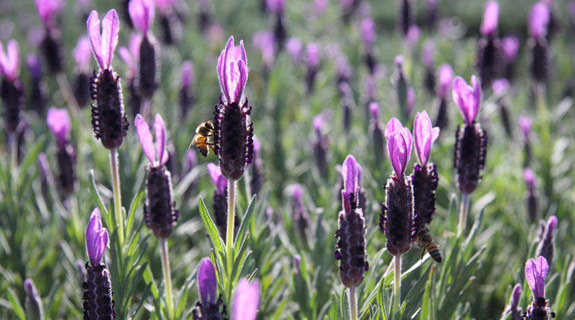Summer has arrived—and so have the mosquitoes and flies. Make them feel less welcome with naturally insect-repelling plants.
Summer has arrived—and so have the mosquitoes and flies. Make them feel less welcome with naturally insect-repelling plants, says Paul Thompson
Photo: Flickr
These are the months when ‘indoor-outdoor flow’ means something more than real estate rhetoric. Days start as we leap from our beds and throw open our doors and windows to the warm and soothing elements.
We are not alone in our enthusiasm for the easy living of the summer months. There are a great many winged insects around to remind us that we live within a vibrant ecosystem. With the onset of summer, it doesn’t take long for our indoors to become extensive food courts and freeways for flies and mosquitoes, who opportunistically treat any open door or window as a welcome sign.
We have perhaps grown less tolerant of our insect cohabitants. A whole industry now thrives on our phobia-like insistence on banishing these so-called pests from our homes and gardens—but often the chemicals we spray on ourselves and around our gardens are considerably more harmful than the insects they target.
When contemplating how to deter houseflies, blowflies and mosquitoes, it is worth briefly looking beyond their antisocial traits and noting their role within the food chain that supports our ecosystem. If we remove these insects from our surroundings, then along with them could go many of our native skinks, frogs, fantails, silvereyes and more—all of which derive important sustenance from this summer rush of winged protein.
The idea, then, is to manage the number of pests that impinge upon our daily lives, while ensuring that sufficient numbers remain available to the animals that need them. We are neither aiming for nor expecting total eradication—just a moderate reduction.
First, encourage the birds that prey on insects. This means planting native trees and shrubs to create a habitat, and leaving part of your garden relatively undisturbed. Ensuring that cats are well fed and have bells on their collars should also help maintain bird populations.
Buzz-off battle plans
Mosquitoes: Any still water is a breeding ground for mosquitoes. Check around your house and garden and remove or pour away any still water you find.
If still water is a feature—a pond, say, or a pot with water lilies or lotus growing in it—then add small goldfish, or some native kokopu, inanga or any of the native Galaxiidae family (commonly known as whitebait), which will feast on any mosquito larvae present.
 Flies: The trick to keeping flies out of the house is to open windows only on the windward side, says ‘Bugman’ Ruud Kleinpaste. Flies don’t like wind and will normally congregate in the shelter of the leeward side of a building. But if you plant some shrubs or hedging on the leeward side of your home, flies will shelter there and be less likely to come through open windows.
Flies: The trick to keeping flies out of the house is to open windows only on the windward side, says ‘Bugman’ Ruud Kleinpaste. Flies don’t like wind and will normally congregate in the shelter of the leeward side of a building. But if you plant some shrubs or hedging on the leeward side of your home, flies will shelter there and be less likely to come through open windows.
Obviously, keeping food in fridges, pantries, tins and tubs also helps reduce those attractions for flies to drop by for a snack. Avoid cooking curries and boiling stock during daylight hours with the windows open.
Let the eight-legged guys do what they do best: encourage spiders in corners close to windows, and they’ll scoff your flies for you.
Make your own fly paper: coat strips of brown paper with a mixture of 120ml golden syrup, 1 tbsp dark brown sugar and 1 tbsp granulated sugar. Hang on strings once the mixture has congealed.



Insect-repelling plants
There are many plants that repel flies and mosquitoes. Growing these in pots, window baskets and gardens close to your house can help give you a slightly less buzzy abode.
- Basil An essential indoor and outdoor culinary herb that not only tastes good but also repels both flies and mosquitoes. Excellent in pots.
- Catnip (Nepeta cataria): Oil from catnip has been found to be more than ten times as effective at repelling mosquitoes as DEET.
- Lavender (Lavandula augustifolia): An ornamental mosquito-repelling plant that likes sun and dry soil. There are recipes online for mosquito repellents made from vodka infused with lavender (spritz it on your skin … drinking it will have an altogether different effect).
- Marigolds (Tagetes patula): These brightly coloured annuals have a particularly pungent aroma that not only repels mosquitoes but also many other insects. They are often planted in vegetable gardens for this reason.
- Pelargonium ‘Van Leenii’: This so-called ‘mozzie buster’ has been implanted with citronella genes that give it a strong lemon scent, which repels mosquitoes.
- Pennyroyal (Mentha pulegium): Often found growing in lawns, this strong-scented mint deters both flies and mosquitoes. Avoid close contact if pregnant.
- Rosemary (Rosmarinus officinalis): An aromatic herb that is useful in cooking and contains oil that repels mosquitoes.
- Southernwood (Artemisia abrotanum): This woody perennial can be planted in pots or in the ground as a hedge around play areas such as sandpits and decks, where it repels both mosquitoes and sandflies.







